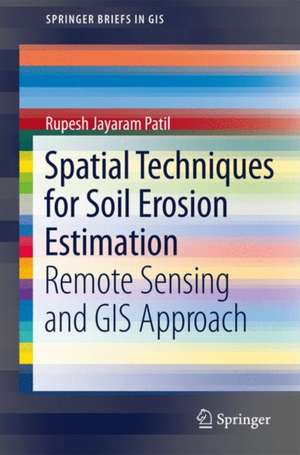Spatial Techniques for Soil Erosion Estimation: Remote Sensing and GIS Approach: SpringerBriefs in GIS
Autor Rupesh Jayaram Patilen Limba Engleză Paperback – 16 feb 2018
This book provides an easy-to-understand basic piece of soil erosion and hydrological research and reaches out to young researchers and students at the graduate and undergraduate levelas well as applicants of soil erosion models.
Preț: 448.89 lei
Nou
Puncte Express: 673
Preț estimativ în valută:
85.89€ • 89.51$ • 71.12£
85.89€ • 89.51$ • 71.12£
Carte tipărită la comandă
Livrare economică 31 martie-05 aprilie
Preluare comenzi: 021 569.72.76
Specificații
ISBN-13: 9783319742854
ISBN-10: 331974285X
Pagini: 106
Ilustrații: XIX, 81 p. 23 illus., 21 illus. in color.
Dimensiuni: 155 x 235 mm
Ediția:1st ed. 2018
Editura: Springer International Publishing
Colecția Springer
Seria SpringerBriefs in GIS
Locul publicării:Cham, Switzerland
ISBN-10: 331974285X
Pagini: 106
Ilustrații: XIX, 81 p. 23 illus., 21 illus. in color.
Dimensiuni: 155 x 235 mm
Ediția:1st ed. 2018
Editura: Springer International Publishing
Colecția Springer
Seria SpringerBriefs in GIS
Locul publicării:Cham, Switzerland
Cuprins
Introduction.- Usle - Gis Based Soil Erosion Assessment: An Overview.- Study Area and Data Collection.- Spatial Techniques for Soil Erosion Estimation.- Distributed Soil Erosion Modelling.- Summary, Conclusions and Suggestions for Further Work.
Textul de pe ultima copertă
This book presents a novel computation of the topographic LS factor of the USLE model to estimate spatial soil erosion. In developing countries, soil erosion is one of the main concerns as it adversely affects agriculture and reduces food production. Therefore, the author presents a particularly relevant approach, as he demonstrates how the C++ programming allows us to identify important erosion stages like detachment and deposition. He does this by assessing the annual rate of soil erosion from the Shakkar River watershed in India using distributed information and applying RS and GIS techniques. He also discusses different approaches that have been proposed to work out the influence of topography on erosion. Simulated and observed data of sediment loss are compared for the period 1992 to 2006.This book provides an easy-to-understand basic piece of soil erosion and hydrological research and reaches out to young researchers and students at the graduate and undergraduate level as well asapplicants of soil erosion models.
Caracteristici
Discusses different approaches on the implementation of the influence of topography on erosion Provides an executable C++ program for computation of the LS factor Important tool for developing regional soil erosion prediction models Useful for prioritization of watersheds to undertake conservation work
